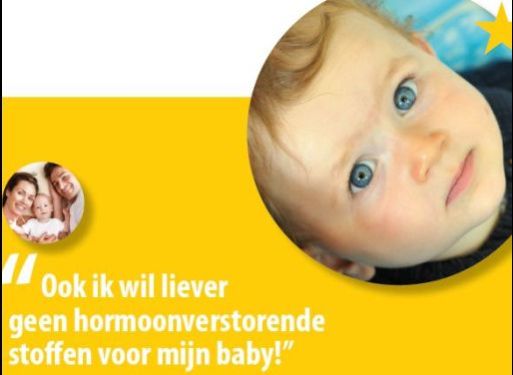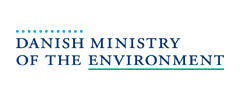1000 Parents and Grandparents Signed Negenmaandenbeurs Petition to the Dutch Health Minister Edith Schippers
A healthy start for all children free from hormone-disrupting chemicals and other harmful substances, it's every parents wish! And it is now possible. Please sign the petition online (in Dutch).
16.03.2015 |

Petition postcard sent to the Dutch Minister of Health. Translation: I don't want hormone disrupting chemicals for my baby
Dear Minister,
I would rather not expose my little one to endocrine disruptors.
Signed,
a concerned (grand)parent
These are the words of the petition on the two-piece postcard that BabyBeGood and Een Veilig Nest wrote for the Dutch Health Minister Edith Schippers. Signatures were collected at the Negenmaandenbeurs – an event in the Netherlands, targeted at (expectant) parents. The signed half of the postcards is heading for the Hague soon, to the Dutch Ministry of Health, Well-Being and Sports. The other half of the cards consists of a quiz on hazardous chemicals in the living environment of children, that concerned parents can fill out at home. Were you not able to visit the Negenmaandenbeurs? With the online petition, it is also possible for you to sign.
Why this petition?
Unborn children are especially sensitive to endocrine disruptors. Therefore, it is advisable that whilst pregnant or planning to become pregnant you minimise your exposure to endocrine disruptors. We produce a lot of hormones naturally in our bodies. These include hormones that play an important role in growth and development, immune system, metabolism, mood and reproduction. It is important to have a healthy balance of these hormones whilst pregnant and be free from endocrine disrupting chemicals that can disturb this balance.
What are endocrine disruptors?
Hormone disrupting substances are chemicals that mimic the naturally occurring hormones in our bodies and disturb our natural balance. We are exposed to endocrine disruptors through many products that we use every day. Hormone disruptors in the endocrine system can have major impact on fetal development. Whilst in the womb the fetus is not protected from these chemicals. A fetus is extremely vulnerable to even just a very low dose of these chemicals and can suffer permanent damage. Exposure to endocrine disruptors during pregnancy is the main cause in the rise of hormone-related diseases. Conditions that are associated with hormone disturbances are: increased infertility, immune system disorders, early breast development in young girls, breast, prostate and other cancers, obesity and diabetes.
We are exposed to these harmful substances through the air that we breathe, the food that we eat (pesticide residues on non-organic fruits and vegetables) and products that we use on our skin that contain harmful substances. It is precisely the accumulation of small quantities over a long period of time that pose a health risk. For example, parabens, a group of preservatives which protect against the adverse effect on fungi and bacteria are often found in personal care products.
The damaging effects of parabens are larger than originally assumed, especially during pregnancy
In 2012, the World Health Organization published a shocking report on endocrine disruptors and their harmful effects. The report, written by leading scientists, summarizes the current scientific literature and details over 800 chemicals known to be endocrine disruptors, parabens being one of them. The report also states that there are thousands of other chemicals on the market in everyday products that are not known to be safe. The report concludes that these substances are likely to have much greater harmful effects on human health that what is currently suspected.
Therefore, we believe it is time for an information campaign on this subject. We are asking Minister Schippers to take endocrine disruptors seriously and provide the public with the information that they need to make informed decisions. We ask that warnings messages are given to all pregnant women: do not smoke, do not drink and avoid endocrine disruptors. Sign the Negenmaandenbeurs petition to keep your little one safe from endocrine disrupting chemicals.
How aware are you of harmful substances in the environment that can effect your baby?
Go to www.eenveilignest.nl to read more and test your knowledge. Een Veilig Nest is the awareness project of the International Gender and Sustainability Network WECF.

This petition is made possible with DG Environment's support via the LIFE+ project ChildProtect.
Related News
WECF co-organising partner Green Pharmacy Conference 2017
The environmental cycle of medicines - an incentive for innovation in the human and veterinary medicine chain
21.09.2017
Recycling contaminates plastic children’s toys with toxic chemicals from electronic waste
A new global survey finds that recycling plastics containing toxic flame retardant chemicals found in electronic waste results in contamination of the world’s best-selling toy: The Rubik’s Cube.
20.04.2017
One step towards a safer blood bag
WECF speaker at final Seminar of the LIFE+ project PVC Free Blood Bag, 27-28 September, in Östersund, Sweden
11.10.2016
WECF sends letter to Dutch Secretary of State concerning EU policy on EDCs
In a joint statement WECF and the EDC Free Coalition ask Dutch State Secretary Dijksma to insist on major changes at the Environmental Council meeting to protect our health and environment.
21.06.2016
Commission's EDC criteria proposal: More humans will have to be harmed before action is taken
The European Commission presented today its proposal for criteria to identify endocrine disrupting chemicals (EDCs). WECF and the EDCfree Coalition condemn strongly the decision.
15.06.2016


































